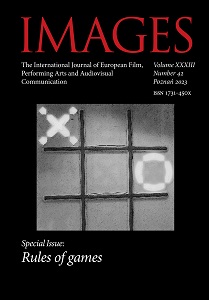Ludologia – naukowe badania gier. Przeszłość, teraźniejszość, przyszłość
Ludology - Academic Games Research. Past, Present, Future
Author(s): Augustyn SurdykSubject(s): Visual Arts, Sociology, Higher Education , ICT Information and Communications Technologies
Published by: Uniwersytet Adama Mickiewicza
Keywords: games research; ludology; Games Research Association of Poland; Digital Games Re-search Association;
Summary/Abstract: The aim of the article is to present similarities and differences in the approaches to the field of ludol- ogy (also known as games research, game studies) in Poland and abroad, on the basis of an analysis of publications and papers presented at conferences of two representative contemporary academic ludological associations – the Polish Polskie Towarzystwo Badania Gier (Games Research Associa- tion of Poland), and the Digital Games Research Association. The achievements of these societies are comparable because of their similar period of activity. The subject of the analysis is the scope of research declared by both associations, the topics of papers presented at international academic conferences organised by them, and the topics of articles occurring in their publications. For the purposes of the analysis, two crucial categories concerning games of all types have been introduced to enable further study of selected texts: the distinction between digital and non-digital games – the former ones refer to electronic games of all types (requiring electricity and based on electronics), and the latter, to any other kinds of games (in some cases also requiring electricity but not electronics). In the analysis, four main thematic categories of papers and articles have been established: (1) texts concerning research in the sphere of digital games, new technologies, new media and related phenomena; (2) texts concerning research on non-digital games and related phenomena; (3) texts concerning other aspects of games and ludology including research on non-specific kinds of games or, quite contrary, concerning different types of games (digital and non-digital) in a particular approach (e.g. educational aspects), methodology of games research, issues common to all games (e.g. players, gameplay, winning/ losing etc.); (4) reviews, reports, forewords, introductory articles and lectures, texts on outstanding scholars etc. The aim of the quantitative analysis is to show the proportions of research devoted to digital games and other issues concerning games research carried out by Polish and foreign ludologists.
Journal: Images. The International Journal of European Film, Performing Arts and Audiovisual Communication
- Issue Year: 33/2023
- Issue No: 42
- Page Range: 49-69
- Page Count: 21
- Language: Polish

